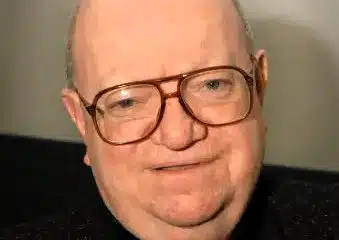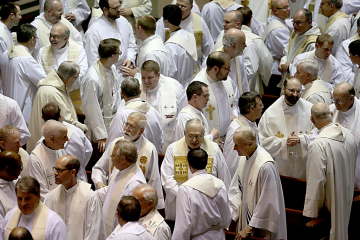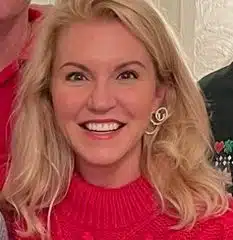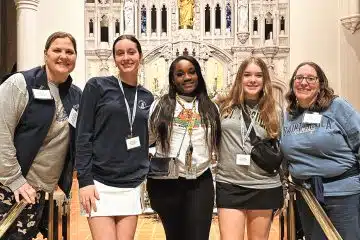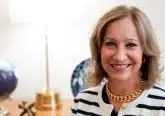XU speakers discuss tragedy of Darfur region
Thursday, February 26, 2009
By Carmen M. Hubbard
ST. FRANCIS DE SALES DEANERY — The future of Sudan — particularly the region of Darfur — and what Americans can do to spread awareness, was the topic of a recent discussion at Xavier University.
“The Tragedy of Darfur and Sudan” with guest speakers Omer Ismail and Simon Deng was held on Feb. 18 at XU’s Cintas Center. James Buchanan, director of the Edward B. Brueggeman Center for Dialogue, and Kathleen Smythe, associate professor of ethics, religion, society and history at Xavier, served as co-facilitators. Among the sponsors for the event were the Brueggeman Center, the Greater Cincinnati Advocates for Darfur Coalition, the National Underground Railroad Freedom Center and the American Jewish Committee.
“We have a chance to be the voice of the voiceless,” Deng told those gathered for the discussion. “I come from a country where slavery still exists.”
 |
| A girl is seen in a camp for internally displaced people outside Kubum in Sudan’s violence-plagued Darfur region. |
Deng was abducted by an Arab man and given as a gift to a relative to be a slave. He was nine-years-old at the time of his abduction and remained in captivity for three-and-a-half years. When his captors wanted to adopt him, they insisted he convert to Islam, but Deng refused.
“I refused to be converted to Islam,” said Deng, who is Catholic. “Islam and Arab are as one in Darfur. Everyone was Muslim but in the south, where they called to every single man to fight in the jihad and declared war on the Christians.”
Deng escaped his enslavement and later worked as a messenger for the Sudanese parliament. He has been most noted for his work to raise awareness about slavery and genocide. He has since become a U.S. citizen.
In May 2005 Deng spoke before the U.N. Human Rights Commission in Switzerland. The following year he launched the Sudan Freedom Walk, which involved trekking 300 miles from the U.N. headquarters in New York City to the Capitol in Washington, D.C., where he met former President George W. Bush. The purpose of the walk was to call an end to slavery and genocide in Sudan. In May 2006 Deng participated in a humanitarian aid mission in southern Sudan and Darkur.
Deng reminded the audience of Dr. Martin Luther King Jr.’s message of “injustice anywhere is a threat to justice everywhere.”
Ismail is a Darfur refugee from western Sudan. He fled his homeland 20 years ago because of his political views. He is the co-founder of Darfur Peace and Development and the spokesman for the advocacy group called Darfur Union.
Given Sudan’s various religions, languages and dialects — most are Muslim and speak Arabic, Ismail said during the discussion the country’s problem has been lack of respect for such diversity.
In Darfur more than 2.75 million people have been displaced as the conflict enters its sixth year, according to Ismail. The conflict began in 2003 when two militia groups overthrew the Sudanese government and the genocide of civilians followed.
“I’d love to see the United States bring intervention (to Darfur and Sudan) but not like in Iraq,” Ismail said to the audience. “Put yourself in my place. If I’m drowning and you extend your arm to me, I don’t care if you’re white or black. If I ask their intention, they might drop me drop me back in.”
However, Ismail said such an intervention could solve one problem and create another.
In 1988 he served as operations manager of the U.N.’s Operation Life Line Sudan. Four years later, he worked for the United Nations in Somalia. Ismail also helped create a think tank called the Sudan Democratic Forum. He was a 2006-07 fellow at the Harvard Kennedy School Carr Center for Human Rights Policy. He currently works as a policy advisor for several agencies working in crisis management and conflict resolution in Africa.
“When we exhaust diplomacy efforts and are not talking, any option is off the table (to establish peace),” Ismail said. “Leave (the diplomacy efforts) to the policymakers. If we’re not satisfied, then they can do something else. I want to see a peace agreement that is sustainable.”


